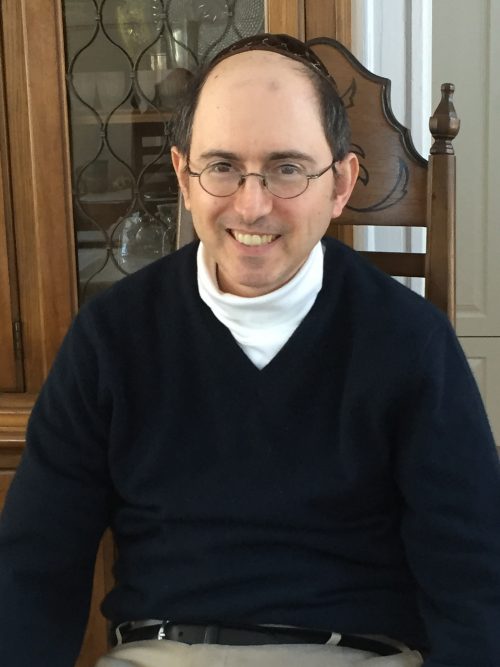Ever since I heard Eli W. deliver his d’var Torah on Parshat Balak, I’ve wanted to sit down with him and find out how he did it. Eli’s words of Torah included allusions to Yiddish folk sayings, Jewish satirical humor as well as references to Shakespeare, Midrash, Rashi and Torah. He presented deep insights about the twists and turns and ironies of the story of Balaam and his donkey and Balaam’s subsequent blessings of the Jewish people. Eli’s words were delivered with self-confidence, at the right speed, and his voice projected so that all could hear and I found myself able to follow each of his many points.
As Eli is a man with developmental disabilities, I knew that this could not have been easy for him to do. How did he manage to write and deliver such a d’var Torah, I wondered?
I came to the home of Eli’s Mom and had a long conversation with Eli. I discovered that he is a true Renaissance man!
Eli grew up in Saratoga, CA, where he was fully included in the regular classes in the South Peninsula Day School through the 8th grade. He davened every day there, and he continued to go to shul with his Dad after he had finished at that school. For his bar mitzvah, Eli delivered a d’var Torah that his Dad helped him write, and he chanted the Haftorah and led Mussaf.
Later, Eli lived in a home in California for adults with developmental disabilities that his Mom, Sally W., was instrumental in founding. There he put his Jewish day school knowledge to work. Each year, the residents would put on a play and Eli came up with the ideas, wrote and directed a significant portion of the plays. There was a play about Noah’s Ark, in which the brontosaurus refused to come into the ark as he wanted to be a vegetarian but that refusal resulted in its extinction. There was the play about the Book of Moses that included the story of Passover, the plagues, and going thru the Red Sea. Then there was the one about Elijah and the contest about who’s G-d is greater. The residents of the home also built and painted the sets that they used for their play productions!
Eli is a perpetual learner. He’s taken courses of all sorts in community colleges, including drama, creative writing, general studies, cooking, debate, public speaking and marine biology. He spent time in Israel doing archeology and working in a lemon orchard. He’s a voracious reader and teaches himself a great deal.
Now, Eli lives in a home in Norwood. He’s very busy these days as he works for Meals on Wheels to deliver food, and he also works for JF&CS Newbridge Senior Center transporting seniors from place to place. Twice a week, he does drama and creative writing at Gateway Arts in Brookline. Eli’s first love is his creative writing and he plans to compile his work into a book and offer it for sale in the Gateways Gift shop. This is quite an ambitious and impressive goal and one I believe Eli can accomplish.
Eli’s social life is very busy too. On Tuesday nights he has a choice of three activities including the “adult social group” at the JCC, “music therapy “ at his residence or “Pizza and Parsha” with Yachad. Wednesdays he attends Temple Reyim’s social group with Yachad. Once a month there is Jewish learning with Sandy Slavitt at the JCC. And many a Sunday, he hangs out with his Jewish Big Brother, Matt, and they do things together such as go out to eat, see movies, or visit museums.
Eli’s shul, Congregation Shaarei Tefilah in Newton, is led by Rabbi Benjamin Samuels who has a vision and an instinct for how to be inclusive, and he leads his congregation toward that sacred goal. Shaarei was one of the first three cohorts chosen to participate in the Ruderman Synagogue Inclusion Project, reflecting the leadership role that it has taken in being inclusive.
So back to the d’var Torah. Rabbi Samuels asked Eli if he’d like to “learn together”. Eli eagerly agreed and together they set the goal of preparing Eli to give a d’var Torah. Eli wrote a first draft, which went through many rounds of editing by his Rabbi, his Mom and Eli himself. Eli told me, “ I included two jokes. I wanted to make people laugh when I gave that speech to make it easier or me to deliver.”
When the d’var Torah was satisfactory to all the parties involved, Eli set about practicing. He practiced at home, he practiced over the phone, he practiced at shul; he practiced in front of his Mom, in front of each of his two sisters, and in front of friends. He received a lot of coaching so that the oral presentation would work better for him. By the time Eli came up on the bimah on the day that he was to talk, his nervousness was gone because he had practiced so much, and he was very excited to deliver his d’var Torah.
Eli received many compliments on his d’var Torah, even some time” after he delivered it. I asked him, would you do it again? “Yes”, he said, after he produces the play he wrote about Purim and when he has a bit more free time. His Rabbi says, “Eli, you’re on the rotation for another D’var Torah! “
This post has been contributed by a third party. The opinions, facts and any media content are presented solely by the author, and JewishBoston assumes no responsibility for them. Want to add your voice to the conversation? Publish your own post here. MORE

